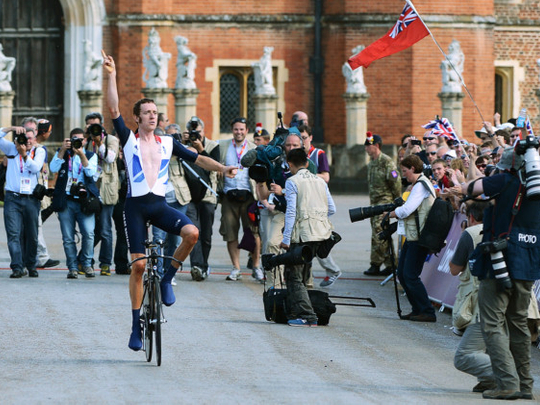
London: Cyclist Bradley Wiggins is uncomplicated off the roads and a Picasso on them.
On Wednesday, Wiggins pedalled his way through the streets of London to win gold at the finish line at Hampton Court Palace, entering the hearts of the British public for the second time in as many weeks and becoming the most decorated British Olympian of all time.
Having entered into the realms of British sporting folklore, Tour de France winner Wiggins then proceeded to dismiss the minor medals he had won in the Olympics and preferred to focus only on gold, stating that he would try and do one better in Rio de Janeiro in 2016.
An athlete’s worth is, after all, judged by the golds he wins and another one of this description in Rio would take Wiggins level with former British rower Steven Redgrave on five.
The point is that while all of Britain is celebrating Wiggin’s unprecedented success, our protagonist said that he hasn’t made the cut yet. Only a sportsman knows the minor details that take them from good to great and Wiggins is nothing if not humble. He is also scrupulously honest as a professional cyclist and advocates the same principles among his teammates and competitors.
Competitive cycling is a tainted sport, one in which, sadly, the tenets of treachery, trickery and dishonesty are occasionally upheld and where riders have been known to pool their resources for black-market purchases of EPO, amphetamines and human growth hormone, to name just a few performance-enhancing drugs
It couldn’t have been a better summer for Wiggins. A few weeks ago he stood on the Champs Elysées celebrating his triumph in the Tour De France — the first ever by a Briton. Wiggins then swiftly and successfully made the change of terrain from the arduous European routes, where he has adopted a more conservative rather than attractive style, to the flatter British countryside to make it a unique double.
It is not Wiggins’ dexterity as a cyclist that makes him stands out, or the fact that he is a hard-nosed winner on his bike, rather it is the endearing nature of his personality that attracts him to the common man. People take Wiggins’ success as their own. It makes them want to celebrate in simple ways: like wanting to go out, buy a cycle and pedal on it.
Possessing both an unconventional and earthy demeanour, the Londoner prefers to toast his fans after his wins rather than the other way around. There is no doubt that in these times of economic meltdown, hopelessness, homelessness and joblessness, Wiggins is the people’s champion. He provides a bit of normalcy, cheer and hope for the future. Given these virtues, it is quite reasonable that a knighthood should be around the corner, though he has vowed to only answer to the name of Bradley Wiggins, or Brad, minus the label.
The huge privilege notwithstanding, Wiggins is at his best when he plays the role of the common man. It comes naturally to him. Not for him the hype, pomp and exaggerated hoopla of celebration. He personifies the British motto of “keep calm and carry on” to the hilt. The fact that he kept TV crews, protocol officials and organisers waiting after finishing his ride, as he went on a pedal-past to thank the crowds and look for his wife and children, is a case in point.
Wiggins’ approach to cycling is transcribed from a singular vision. Rather than overindulge on strategy, he does better at the show-and-tell part, which is the actual business of pedalling the bike to the finish line in the shortest possible time. He learns by absorbing situations on the track and then incorporates them into his already sophisticated awareness for situations.
There is something very ordinary and human about cycling. It makes for great viewing, simply by virtue of the terrain and tracks on which it is conducted. Small wonder then that the streets of London and the muddy lanes in the surrounding countryside were packed with people who came out to show their unwavering solidarity for a fellow Briton who will go on to inspire a generation of cyclists with dreams of being a winner.
In a sporting world where an athlete’s image is very much the product of media spin, public relations and image makeovers, Wiggins has a finger on the pulse on what makes him successful. He should now bottle the formula and sell it.











